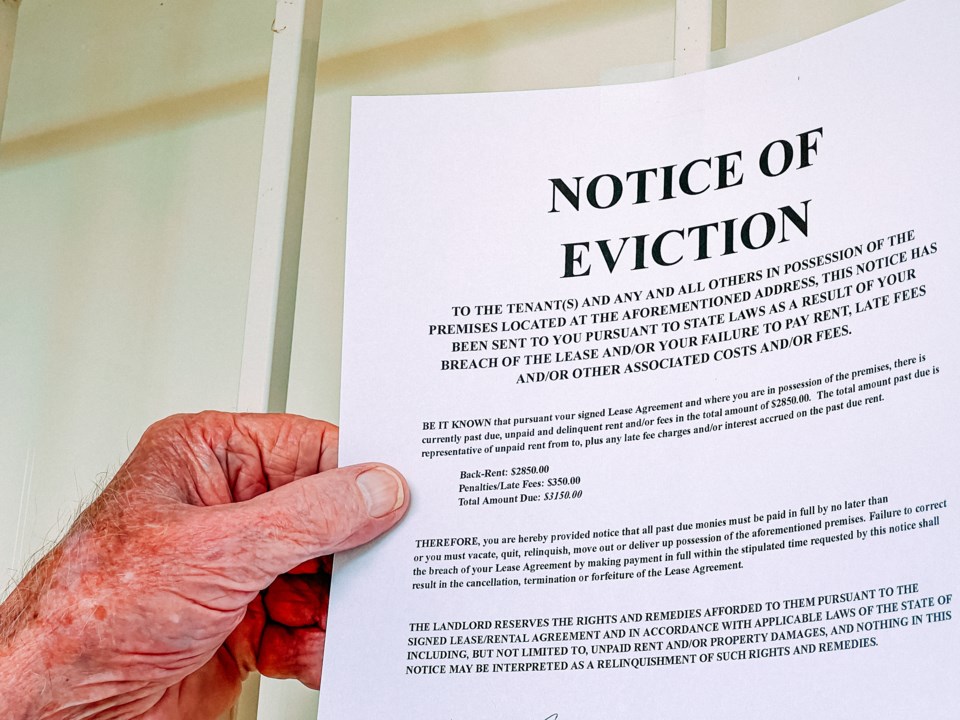THUNDER BAY — The District of Thunder Bay Social Services Administration Board won't be evicting a tenant who owed about $5,000 in rent.
Instead, a provincial tribunal has approved a payment plan under which the individual has 26 months to pay the arrears in instalments.
The social services board initially served the tenant with a valid Notice to End Tenancy Early for Non-payment of Rent, and the person failed to void the notice by paying the arrears by a deadline.
The matter was scheduled to proceed to a Landlord and Tenant Board hearing in May of this year, where an order to terminate the tenancy would be considered.
In the interim, however, the tenant and DSSAB reached a payment agreement.
The tenant did not attend the hearing, but DSSAB's legal representative told the LTB the person has special needs, and that the parties had settled on terms for payment.
The hearing officer ruled "it would not be unfair to grant relief from eviction," and approved a plan for restitution of $4,979 in unpaid rent plus $186 for costs incurred by the social services board in making the application.
The officer also ordered that the regular monthly rent be paid on time and in full on the due dates until arrears are paid in full.
He said failure to make any of the scheduled rental or arrears payments on time will allow DSSAB to reapply for eviction.
DSSAB's preferred way of dealing with arrears is to enter into payment agreements rather than force any of its 2,500 tenants to leave.
Its policy calls for proactive engagement with tenants whose rent is overdue where there is no threat to the safety of other tenants or staff.
The board currently has payment arrangements with 106 individuals whose arrears total $174,000.
CAO Ken Ranta said discussions typically begin with tenants if they are two or more months in arrears.
"At that point we say 'OK, how are we going to address this? What are the options?' If an individual's circumstances have changed, and their rent-geared-to-income amount has changed, we can do a rent calculation at that point. If it's a matter of not having the ability to make a full payment, that's when we start the discussions on a repayment plan to structure it over a period of time."
Ranta said it is relatively rare for the social services board to apply for eviction.
"If an individual is not keen on engaging in discussions and a repayment plan, then our limited last option is to go to the Landlord and Tenant Board to seek an eviction notice. However that's not typically the end goal. Sometimes, realizing that eviction is a possible end option, an individual is then encouraged to participate in a repayment plan."
It seems that was how things played out in the case recently heard by the LTB.
Ranta said when a hearing does become necessary, the board still wants to know what efforts the parties have made to make arrangements that would avoid eviction.
Most hearings are held online.
"Prior to the hearing in front of an adjudicator, you can seek sort of a sidebar – we'll call it an opportunity to negotiate, to do a sort of final last-ditch effort to mediate. If that occurs, then we can actually, online at the same time, say the matter has been resolved, that a repayment plan is in play."
He said that of the 70 repayment agreements reached so far this year, 61 involve arrears totalling less than $1,000 each.
"They are typically small amounts. In extreme cases where it's not only an arrears matter, but also a behavioural matter or a quiet satisfaction/enjoyment of the property matter, those can go forward to the LTB because it's more than just repayment. There's actually concern or safety or behavioural issues that are looking to be addressed, and so they can be coupled together, an arrears matter with the same tenant that has a behavioural issue."
